Israeli forces have pushed deep into the ruins of Gaza's northern edge to recapture an area from Hamas fighters, while in the south tanks and troops pushed across a highway into Rafah, leaving Palestinian civilians scrambling to find safety.
Some of the most intense fighting for weeks is raging in both the north and south. Israeli operations in Rafah, which borders Egypt, have closed a main crossing point for aid, which humanitarian groups say is worsening an already dire situation.
Hundreds of thousands of people are being forced to flee again after around half of Gaza's population took sanctuary there after being pushed south by fighting elsewhere.
Gaza's health authority today appealed for international pressure to reopen access via the southern border to allow in aid and medical supplies.
"The wounded and sick suffer a slow death because there is no treatment and supplies and they cannot travel," it said.
It also said that the besieged Palestinian territory's health system is "hours away" from collapse, after fighting has blocked fuel shipments through key crossings.
"We are just hours away from the collapse of the health system in the Gaza Strip due to the lack of the necessary fuel to operate generators in hospitals, ambulances, and (for vehicles to) transport staff," the ministry said in a statement.
A foreign UN staff member was killed on Monday when a vehicle travelling to a hospital in Rafah was struck - the first international UN casualty in the Gaza war, a UN spokesperson said.
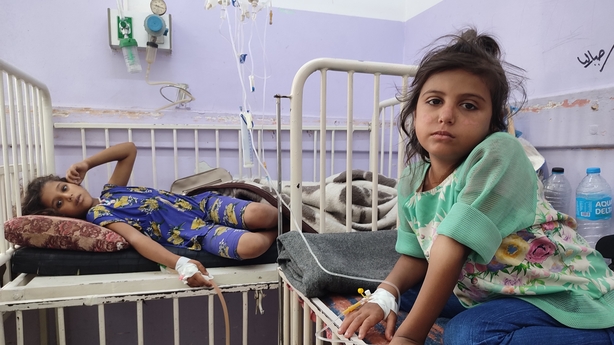
In northern Gaza's Jabalia, a sprawling refugee camp built for displaced Palestinians 75 years ago, Israeli forces pushed into an area where they claimed to have dismantled Hamas months ago.
Residents fled along rubble-strewn streets carrying bags of belongings. Tank shells landed in the centre of the camp and health officials said they had recovered 20 bodies from overnight airstrikes.
"We don't know where to go. We have been displaced from one place to the next... We are running in the streets. I saw it with my own eyes. I saw the tank and the bulldozer. It is on that street," said one woman, who did not give her name.
The Palestinian death toll in the war has now surpassed 35,000, with 57 killed in the past 24 hours, according to Gaza health officials, whose figures do not differentiate between civilians and fighters.
Clashes raged in northern and central Gaza today, as well as in far-southern Rafah, despite US warnings against a full-scale invasion of the crowded city and of the threat of post-war "anarchy" across the Palestinian territory.
AFP correspondents in Gaza reported helicopter strikes and heavy artillery shelling in the east of Rafah, as well as battles in northern Gaza's Jabalia refugee camp and Gaza City's Zeitun neighbourhood.
Hamas's armed wing, the Ezzedine al-Qassam Brigades, also said that its militants were engaged in ground battles in Rafah and Jabalia.
A strike overnight on a house in Rafah killed at least four people, said the city's Kuwaiti hospital.
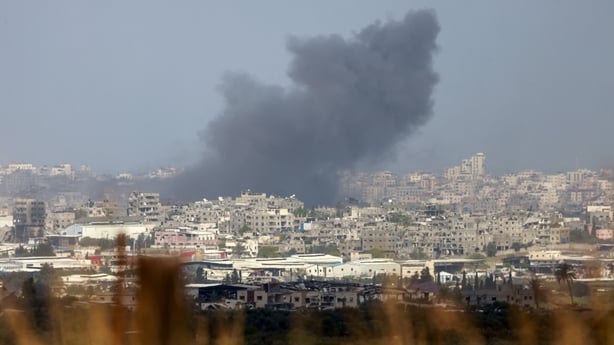
Israel last week defied a chorus of warnings, including from top ally Washington, and sent tanks and troops into the east of Rafah, the city on the Egyptian border where some 1.4 million Palestinians had sought shelter.
This has sparked an exodus of nearly 360,000 people from Rafah so far, said the UN agency for Palestinian refugees UNRWA, which warned that "no place is safe" in the largely devastated territory.
Rafah residents today received more evacuation orders through phone calls and text messages, prompting yet more people to leave their homes, witnesses said.
Earlier, the Executive Director at UNICEF Ireland warned that the Erez crossing does not have the capacity to provide the level and scale of humanitarian assistance that is needed in Gaza.
Speaking on RTÉ's Morning Ireland, Peter Power added that transporting aid from north to south Gaza is very difficult and the majority of aid is coming in from the south.
He said continued attacks on Rafah will result in "catastrophe and devastation".
"More than anything now, the people of Rafah need a ceasefire," he said.
Rafah is about a tenth of the size of county Dublin but has been "housing 1.2 million people in terrible conditions for months", Mr Power said.
He also warned the so called safe areas are not safe and the conditions are not sustainable for those forced to move there.
Mr Power added humanitarian workers are saying they have never before seen the type of conditions that people are being forced to live in.
The US meanwhile raised with Israel an incident of protesters blocking aid trucks headed for Gaza, US State Department deputy spokesperson Vedant Patel said today, adding that humanitarian assistance into the enclave should not be impeded.
Israeli protesters blocked aid trucks headed for Gaza today, strewing food packages on the road in the latest in a series of incidents that have come as Israel has pledged to allow uninterrupted humanitarian supplies into the besieged enclave.
We need your consent to load this rte-player contentWe use rte-player to manage extra content that can set cookies on your device and collect data about your activity. Please review their details and accept them to load the content.Manage Preferences
While Israel has vowed to destroy remaining Hamas forces in Rafah, the New York Times cited unnamed US officials as saying that both US and Israeli intelligence suggested the group's leader Yahya Sinwar was not hiding there.
Sinwar - who has not been seen since the 7 October attack which Israel says he orchestrated - "most likely never left the tunnel network" under southern Gaza's main city of Khan Yunis, the newspaper said.
Amid the fighting, Egyptian, Qatari and US mediation efforts towards a truce appeared to have stalled.
UN chief Antonio Guterres urged "an immediate humanitarian ceasefire, the unconditional release of all hostages and an immediate surge in humanitarian aid" into Gaza.
As Israel marked its memorial day today, sirens sounded across the country at 11am local time (9pm Irish time), prompting a two-minute silence in honour of fallen soldiers and civilian victims of attacks.
Memorial day comes ahead of the country's 76th Independence Day, beginning tonight at sunset, when Israelis celebrate the creation of their state in 1948.
Palestinians remember Israel's establishment as the "Nakba", or catastrophe, when hundreds of thousands were expelled or pushed out of their homes amid the war, and commemorate it annually on 15 May.
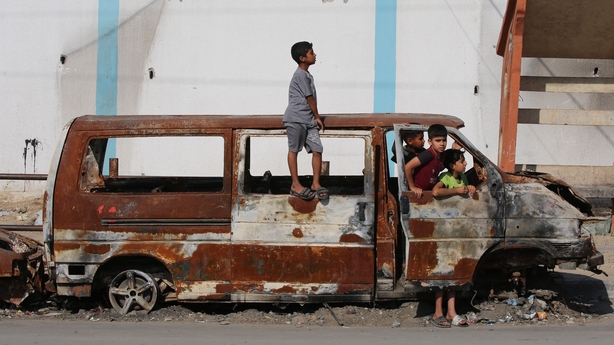
Israeli offensive in Rafah would not eliminate Hamas - Blinken
An all-out Israeli offensive on the city of Rafah in Gaza would provoke "anarchy" without eliminating Hamas, US Secretary of State Antony Blinken has said, as Washington stepped up a pressure campaign against such an assault.
Separately, US National Security Advisor Jake Sullivan emphasised US concerns about an offensive in a call with his Israeli counterpart, Tzachi Hanegbi.
"Mr Sullivan reiterated President Biden's longstanding concerns over the potential for a major military ground operation into Rafah, where over one million people have taken shelter," a White House readout of the phone call said.
It said Mr Hanegbi "confirmed that Israel is taking US concerns into account," but did not elaborate.
The United States and other countries, as well as top UN officials, have warned that a full assault on Rafah could have a disastrous impact on the refugees driven there by fighting elsewhere in Gaza, many of them living in desperate conditions.
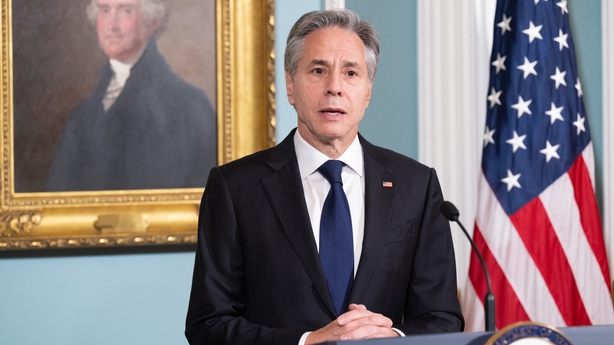
Israel has said it is attempting to keep civilian casualties to a minimum.
However, Mr Blinken, when asked by US media whether the US concurred with Israeli Prime Minister Benjamin Netanyahu's statement that Israeli forces had killed more civilians than Hamas militants since the war began, replied simply, "Yes, we do."
Mr Blinken said a full-scale invasion could come "potentially at an incredibly high cost" and that even a massive assault on Rafah was unlikely to end the Hamas threat.
"Israel's on the trajectory, potentially, to inherit an insurgency with many armed Hamas left, or if it leaves, a vacuum filled by chaos, filled by anarchy and probably refilled by Hamas," he said.
Mr Blinken also confirmed that the hold President Joe Biden has placed on weapons to Israel - as the US continues pressing it to better protect civilians and avoid an all-out invasion of Rafah - is limited to 3,500 "high-capacity" bombs.
He said the United States was continuing to press Israeli leaders to provide a plan for Gaza once the war is finally over, telling NBC's Meet the Press that "we've been talking to them about a much better way of getting an enduring result."
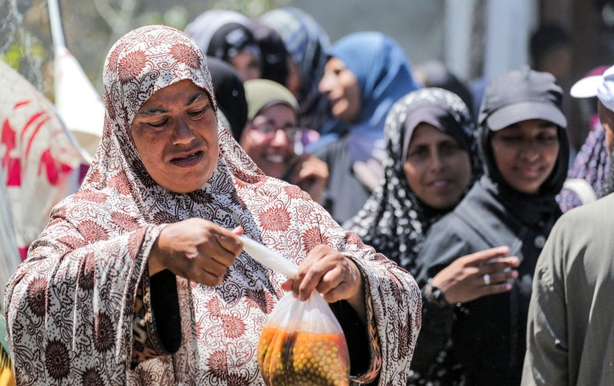
The US diplomat said Hamas militants had already returned to certain areas of northern Gaza that Israel had "liberated."
Mr Blinken also spoke yesterday with Israeli Defence Minister Yoav Gallant, insisting again the United States opposed a major Israel ground operation in Rafah, the State Department said.
"The Secretary underscored the urgent need to protect civilians and aid workers in Gaza and urged the Minister to ensure assistance can move into Gaza and help address distribution challenges inside of Gaza as Israel pursues Hamas targets," State Department spokesman Matthew Miller said in a statement.
More than seven months into the war, UN General Secretary Antonio Guterres urged "an immediate humanitarian ceasefire, the unconditional release of all hostages and an immediate surge in humanitarian aid."
The bloodiest ever Gaza war broke out after Hamas's 7 October attack on Israel, which resulted in the deaths of more than 1,170 people, mostly civilians, according to an AFP tally based on Israeli official figures.
Militants also seized some 250 hostages, scores of whom were freed during a week-long truce in November. Israel estimates 128 captives remain in Gaza, including 36 the military says are dead.
Israel's bombardment and offensive in Gaza have killed at least 35,091 people, mostly women and children, according to the health ministry in the Hamas-run territory.
Israel's military says 272 soldiers have been killed since the start of the ground offensive in Gaza on 27 October.
The war has displaced most Gazans, many multiple times.

